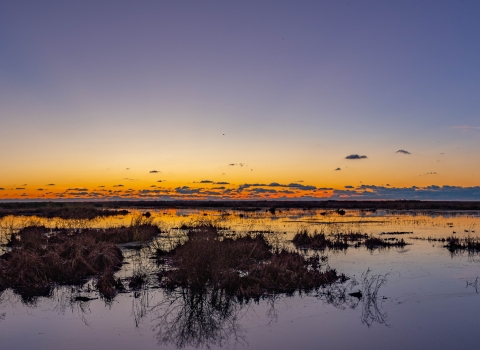PALISADE, CO - Endangered fish relying on flow in the Colorado River near Grand Junction, Colorado, will soon get a welcome boost when additional water in Ruedi Reservoir near Basalt, Colorado, is made available to enhance streamflows during this increasingly concerning drought year.
The Bureau of Reclamation, which owns and manages Ruedi Reservoir, announced the good news on September 19, 2020 that additional water will be made available for endangered fish. This water is the result of collaboration among multiple partners. Foremost among these is XTO Energy (a subsidiary of ExxonMobil), who generously donated 5,000 acre-feet* of water in Ruedi to which they have rights, enabling its release for this purpose. In addition, the Ute Water Conservancy District in Grand Junction, the Colorado River District, and the Town of Palisade have stepped forward and collectively made 3,685 acre-feet of additional Ruedi Reservoir water available for the same need.
Since July of this year, the Bureau of Reclamation, U.S. Fish and Wildlife Service, and Colorado River District have been releasing water earmarked for endangered Colorado River fish from Granby, Wolford Mountain, and Ruedi reservoirs. However, persistent hot and dry weather has continued to deplete flow in the critical river reach upstream of Grand Junction, putting increasing stress on the endangered fish for whom that serves as critical habitat – including Colorado pikeminnow and razorback sucker.
For the Colorado River near Grand Junction, this latest 8,685 acre-feet means additional augmented flow for fish in September and October, beyond what otherwise would be available. Delivery of this water as in-stream flow will benefit not only the four endangered fish – the Colorado pikeminnow, razorback sucker, humpback chub and bonytail – but also the many water users and power providers who rely on Upper Colorado River Endangered Fish Recovery Program efforts to enable their own continued water uses. It also could be used to help alleviate the impacts of ash and sediment washing into the Colorado River from burned areas recently scorched by West Slope wildfires.
Other parties in addition to those already mentioned were instrumental in making these water transfers happen, including the Colorado Water Conservation Board and the Colorado Water Trust. “Our public and private partners are amazing at coming up with flow solutions to benefit fish, including in drought years like this” said Tom Chart, Recovery Program Director. “Without their collective expertise and collaborative efforts, we’d struggle to find sufficient water for these fish.”
Jeff Rieker, Eastern Colorado Area Manager at the Bureau of Reclamation added, “In a time of critical water shortage, it was great to see XTO Energy and others step forward and offer a solution that benefits endangered fish and water users throughout the river basin who rely on the fish recovery program to continue utilizing water.”
Of note, Grand Valley water users also will enjoy some benefits associated with the “push” for their own agricultural water deliveries provided by these water releases. Mark Harris, General Manager of the Grand Valley Water Users Association and a farmer under the Grand Valley Irrigation Company system, says “I want to thank ExxonMobil for its generous donation of water to the 15-Mile Reach of the Colorado River for the Endangered Fish Recovery Program here in the Grand Valley. In a water year like 2020, as in 2018, the increased river flows provided by ExxonMobil’s water contribution to benefit the endangered fish also benefit the farmers, and indeed, all the water users, in the Grand Valley. By adding water to the Colorado River, Exxon’s contribution helps assure the proper operation of our diversion structures for the benefit of not only the Grand Valley Water Users Association and the Grand Valley Irrigation Company, but also the Orchard Mesa, Palisade, and Mesa County Irrigation Districts and all their customers. In addition, these ExxonMobil contributions support Endangered Species Act compliance for many of us on the West Slope. Thanks again ExxonMobil… from all of us in the Grand Valley.”
XTO Energy’s Greg Russell says that “We are committed to protecting the environment and the well-being of communities where we operate. As we did in 2002 and 2018, we are donating water to the Recovery Program to help the State of Colorado, support local water users, and preserve these critical habitats.”
Colorado Water Conservation Board Director Rebecca Mitchell added, "In Colorado, regardless of being a public or private entity, we all have in common an understanding of and passion for conserving our water for our state's native fish and for present and future generations. Especially during severe drought conditions, this effort at Ruedi Reservoir is an example of how Colorado businesses and individuals come together to make our state a better place for all.”
*An acre-foot is approximately enough water to cover a football field one foot deep, or enough to supply about two typical households with water for a year.
The Recovery Program is a partnership of local, state, and federal agencies, water and power interests, and environmental groups working to recover these endangered fish while water development continues in the upper Colorado River basin. www.coloradoriverrecovery.org, or connect with us through any of these social media channels: Facebook, Twitter, Flickr, and YouTube.
The mission of the U.S. Fish and Wildlife Service is working with others to conserve, protect, and enhance fish, wildlife, plants, and their habitats for the continuing benefit of the American people. For more information on our work and the people who make it happen in the West, connect with us through any of these social media channels: Facebook, Twitter, Flickr, YouTube, and Instagram.



